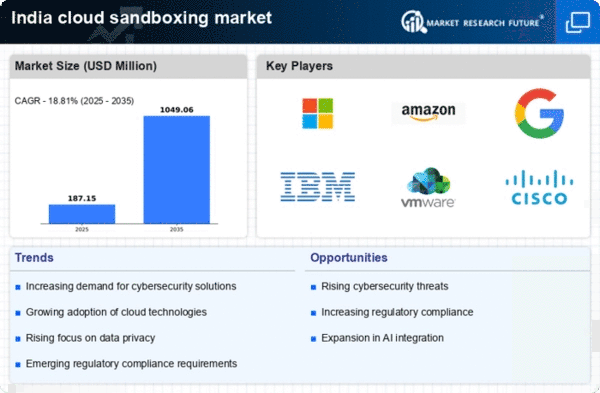The cloud sandboxing market in India is characterized by a dynamic competitive landscape, driven by the increasing demand for cybersecurity solutions amid rising digital threats. Major players such as Microsoft (US), Amazon (US), and Palo Alto Networks (US) are strategically positioning themselves through innovation and partnerships. Microsoft (US) focuses on integrating advanced AI capabilities into its sandboxing solutions, enhancing threat detection and response times. Amazon (US) emphasizes scalability and flexibility, leveraging its extensive cloud infrastructure to offer tailored sandboxing solutions. Meanwhile, Palo Alto Networks (US) is enhancing its offerings through strategic acquisitions, aiming to consolidate its market presence and expand its technological capabilities. Collectively, these strategies contribute to a competitive environment that is increasingly focused on technological advancement and customer-centric solutions.
Key business tactics within this market include localizing services to meet regional compliance requirements and optimizing supply chains to enhance service delivery. The competitive structure appears moderately fragmented, with several key players vying for market share. However, the influence of major companies is substantial, as they set industry standards and drive innovation. This competitive dynamic encourages smaller firms to innovate rapidly or seek partnerships to remain relevant in the evolving landscape.
In October 2025, Microsoft (US) announced the launch of its new cloud sandboxing service, which integrates machine learning algorithms to improve threat detection accuracy. This strategic move is significant as it positions Microsoft (US) at the forefront of cybersecurity innovation, potentially attracting a broader customer base seeking advanced protection against sophisticated cyber threats. The integration of AI into sandboxing solutions may also enhance operational efficiency for clients, thereby solidifying Microsoft’s competitive edge.
In September 2025, Amazon (US) expanded its cloud sandboxing capabilities by partnering with a leading cybersecurity firm to enhance its threat intelligence offerings. This collaboration is likely to bolster Amazon's (US) market position by providing customers with more robust security features, thereby addressing the growing concerns around data breaches and cyberattacks. Such partnerships may also facilitate the development of more comprehensive solutions that cater to diverse industry needs.
In August 2025, Palo Alto Networks (US) completed the acquisition of a prominent cybersecurity startup specializing in automated threat response technologies. This acquisition is indicative of Palo Alto's (US) strategy to enhance its product portfolio and deliver cutting-edge solutions that address the evolving threat landscape. By integrating these advanced technologies, Palo Alto Networks (US) aims to provide clients with faster and more effective responses to cyber threats, thereby reinforcing its leadership position in the market.
As of November 2025, current trends in the cloud sandboxing market include a pronounced shift towards digitalization, sustainability, and the integration of AI technologies. Strategic alliances are increasingly shaping the competitive landscape, as companies recognize the value of collaboration in driving innovation. Looking ahead, competitive differentiation is likely to evolve, with a greater emphasis on technological innovation and supply chain reliability rather than solely on price. This shift suggests that companies that prioritize R&D and customer-centric solutions will be better positioned to thrive in the future.

















Leave a Comment